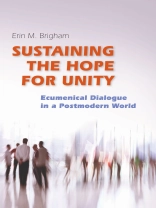What is unity and how does it serve as a goal for ecumenical dialogue? How can churches, ecumenical organizations, ministers, and theologians effectively approach this goal in the twenty-first century?
Sustaining the Hope for Unity offers a methodological reflection on these questions using insights of contemporary critical theory.
With particular attention to the work of Jürgen Habermas, the book develops a framework for exchanging religious narratives in a postmodern context marked by pluralism and ambiguity. Using this framework to address questions that have emerged out of the life of the World Council of Churches,
Sustaining the Hope for Unity argues that unity must be imagined eschatologically in order to achieve inclusive and non-coercive dialogue between diverse Christian communities. Looking ahead to ecumenism in the twenty-first century, it makes a case for the role of the WCC as a public space for the exchange of religious narratives.
Sobre o autor
Erin Brigham is the Faculty Coordinator of Research for the Joan and Ralph Lane Center for Catholic Studies and Social Thought and Adjunct Professor in the Theology and Religious Studies Department of the University of San Francisco. She earned her Ph D in systematic and philosophical theology at the Graduate Theological Union in 2010. Her research interests include Catholic public theology and social thought as well as post-conciliar ecclesiology and ecumenism. Her work has appeared in Ecumenical Review, The Journal of Ecumenical Studies, and other periodicals.







![Capa do Brian Schrag & Julisa Rowe: Community Arts for God's Purposes [Chinese] 貼近神心意的社群藝術 Capa do Brian Schrag & Julisa Rowe: Community Arts for God's Purposes [Chinese] 貼近神心意的社群藝術](https://static.worldofdigitals.com/thumb_webp/740/9781645083740.webp)




